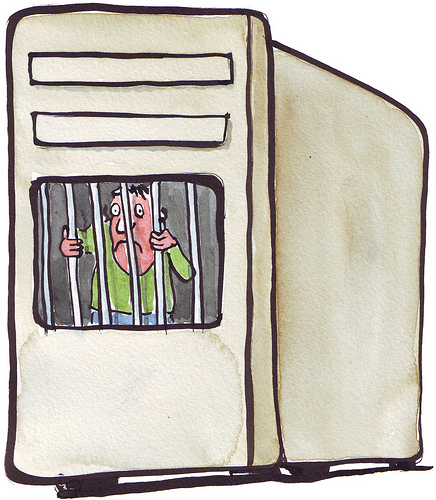
Keeping the Mind Healthy
 Writing is a lonely activity. The writer is confronted to a white page that has to be filled with characters, plot, and storyline, all the fruit of his imagination. Like anybody else, writers have good and bad days. On a good day, the white page will soon darken as the writer is able to create a fictional world and populate it. This, of course, means he gets disconnected from the real world. On a bad day, the white page stares at the writer and refuses him access to the fictional world.
Writing is a lonely activity. The writer is confronted to a white page that has to be filled with characters, plot, and storyline, all the fruit of his imagination. Like anybody else, writers have good and bad days. On a good day, the white page will soon darken as the writer is able to create a fictional world and populate it. This, of course, means he gets disconnected from the real world. On a bad day, the white page stares at the writer and refuses him access to the fictional world.
This means that fiction writers live in a border town between reality and fiction, where the border guards are whimsical beings, sometimes abiding by recognizable rules and sometimes not, leaving the writer in a kafkaian situation where entry or exit to either of these worlds is granted haphazardly.
As a result, writers have a higher propensity for depression and bipolar disorder, Example of depressed famous and bi-polar writers abounds as can be seen here. This is not new.
In addition, today’s writers are more likely to write from a computer, performing research on-line, seeking reprieve from a mental block in various computer games and marketing their books through the virtual social network.
As a result, their social interactions are even further reduced, leading to additional problems such as anxiety (leading to insomnia), information overload and computer addiction.
How to handle these?
Anxiety: anxiety in writers often stems from writer’s block, when the border guards refuse access to the fictional world and the writer is condemned to be exiled from his second half for unknown periods of time. However, there are a few techniques the writer can use to bypass the block.
- Getting support: Be it from a structured writer’s group or friend or family, discussing the problematic storyline, character or plot with another person might just open new perspective and enable bypassing the block
- Taking a break: whether just taking a walk in the park, reading a book or leaving the problematic spot in the narrative to tackle a different chapter, taking a break from trying too hard to force entry into inspiration might achieve just the desired result.
- More cures on http://silviahartmann.com/writers-block-help.php
Information Overload: Writing implies research. With the ever-expanding sources of information available at the tip of a keyboard, finding the appropriate info without getting lost or baffled by contradictory sources is becoming incredibly difficult and time-consuming. The result might be Information Overload Syndrom.
The best prevention is discipline and improving research techniques. Discipline to avoid checking e-mails or forums and limiting the scope of the research, and research techniques to filter out the massive amount of junk that litters the Internet. http://depthome.brooklyn.cuny.edu/economics/internetresearch.htm is a good starting point to find ways of improving research methods and efficiency.
Computer addiction: As writers main tool is the computer, falling into a pattern that turns the computer into the source of everything, is a pit one easily falls into, leading to computer addiction. Computer addiction, in turn, leads to social ills, isolation, loneliness, divorce, estrangement, etc.
Once again, discipline is the key to avoid falling into that trap. Having a schedule including non-computerized activities and social interactions, be it with family, friends or any kind of live social group and making it a cardinal rule to stick to that schedule is the easiest way to avoid falling into that trap.